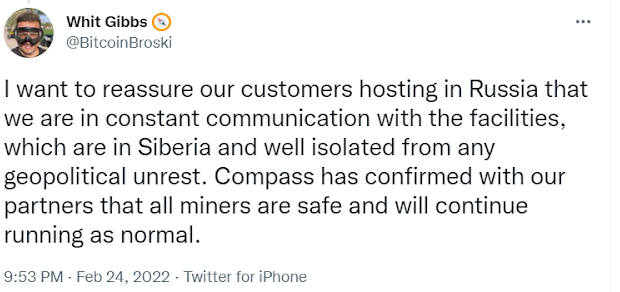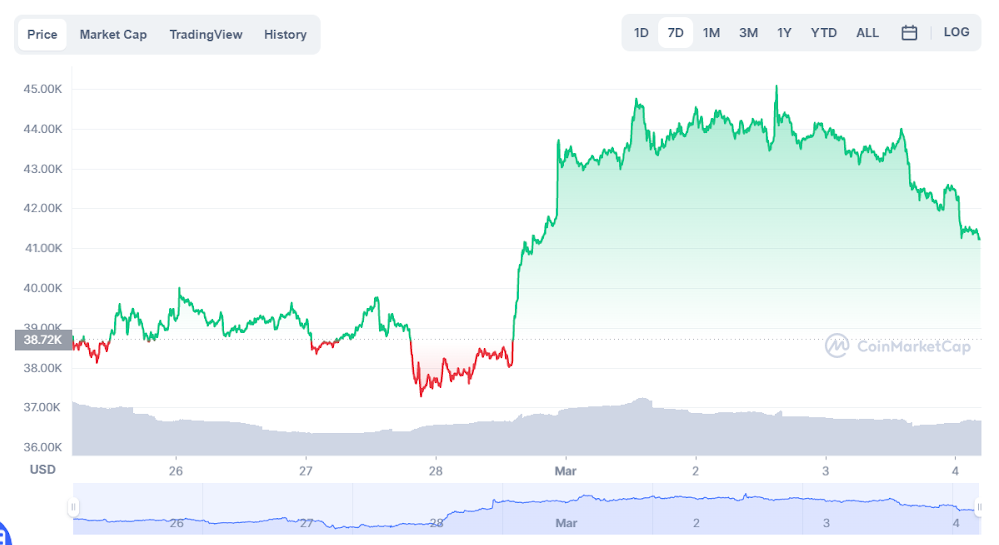In times of crisis, there is no good; there?s only the best course of action, given the circumstances. Is crypto good in the context of Russia?s invasion of Ukraine? Is it bad? Neutral? It?s a hard question to answer.
With wars come worries and uncertainty and that is very prominently visible in how global markets have been reacting to Russia?s invasion of Ukraine. Stock markets have plummeted since February 24 after Russian President Vladimir Putin announced a military operation, and cryptocurrencies were certainly not spared from the aftermath.
Bitcoin slid below $40,000 and Ether tumbled as much as 9.4% as the Ukraine crisis deepened, with Western nations imposing new sanctions on Russia after President Vladimir Putin refused to stop attacks on its neighbor. Not only the prices of cryptocurrencies but the BTC hashrate were also affected.
In this blog, we?re going to shed some light on the impacts this Russia-Ukraine has had on the crypto market so far.
War Puts Crypto To Test
Table of Contents
Cryptocurrency is now a more mainstream part of the global financial system, which means that ? for better or for worse ? it?s inevitably a part of international conflict, too. Bitcoin, the largest cryptocurrency by market value, dropped by around 5% to about $37,450 on 26th Feb, while Ether?s slump briefly took it below $2,600.
However, one thing that took us aback was that despite the indications of war the real daily BTC trading volume (the term ?real trading volume? refers to data sourced from exchanges that are believed to be reputable and free of wash trading activities), surged above the $10 billion on Feb. 24, the first day of the invasion, marking the highest daily volume recorded since Dec. 4.
One can?t really be sure of Bitcoin. Ever. Isn?t it?
Bitcoin trading denominated and the Russian ruble went into overdrive when the invasion began. Daily volumes rose 259% from a day earlier to 1.3 billion rubles or $13.1 million. In Ukraine, crypto exchange Kuna saw its daily trading volume more than treble to 150 million hryvnias or $5 million.
Even as global markets struggled amidst the war, cryptocurrencies traded in the green. Bitcoin rose from the $38,000 touch down to a $44,000 mark, currently trading at $41,233.
ETH also went green and is trading at $2,791, briefly touching $3,000 on Mar 3. Bitcoin, USDT Tether, and Ethereum also saw a significant rise in their volumes traded in the last 48 hours. The BNB token, native to the Binance exchange, zoomed up by 8.54% in the last 7 days.
Why the Greener Side?
Well, presumably because investors are “trying to get out of the ruble” after its drastic devaluation after all the sanctions. The Russian investors are now leaning towards Stablecoins. Another factor that may be pushing up crypto prices is growing unease among younger investors about government actions that affect currency prices, including the economic sanctions against Russia.
Bitcoin Mining in Russia Mostly Unaffected Amid War
With the conflict growing, the community is curious to know about the large quantity of hashrate located in Russia, as the region reportedly controls the third-largest sum of SHA256 hash power worldwide.
Hashrate is a measure of the computing power dedicated to the network, as “miners” run software on specialized hardware in an attempt to win freshly minted BTC ? by doing so, they help secure the network from attack.
The Bitcoin hash rate did appear to take a hit from the conflict. It was around 189.07 million terahashes per second on Feb 28, down from a record 214.5 million terahashes on Feb. 18, according to data from Blockchain.com. Nonetheless, the hit is not as huge as what we saw during China?s crypto crash in 2021.
Furthermore, on February 24, the Ethereum mining operation Flexpool announced it has halted services to Russia entirely. ?We apologize to our Russian miners; many of you do not support the war ? However, it is you who are supporting your nation,? Flexpool told its users.
However, for the most part, Bitcoin mining in Russia remains steady, though sanctions could change the calculus for miners?who come into regular contact with exchanges and other entities connected to the traditional financial system as they exchange BTC for cash.
Russia was responsible for over 11% of the global Bitcoin hashrate as of July 2021, Cambridge Center for Alternative Finance reports.
Not much impact can be noticed as most of the Russian bitcoin mining is powered by domestic natural gas or [hydroelectric power] in Siberia. So, unless sanctions influence pool providers, it is unlikely that hash power goes offline.
Compass Mining CEO Whit Gibbs added via Twitter that the company’s facilities in Russia are “well isolated from any geopolitical unrest.”

It is quite unlikely that Russia will go against Bitcoin mining, at least in the immediate future, as it focuses on winning a costly war and as the West applies sanctions to its banks and businesses. According to Putin, Russia has “certain competitive advantages” given its “surplus of electricity and well-trained personnel available in the country.”
Crypto in Ukraine and Russia
With financial services and markets severely disrupted in both Russia and Ukraine, there have been flow-on effects for the use of cryptocurrencies. Several reports pointed to data from Jan-Feb 2022, showing a significant surge in crypto purchases from Ukrainian citizens.
Around the time the full-scale Russian invasion began, daily Tether (USDT) stablecoin purchases on Binance via the Ukrainian hryvnia increased from around $2.5 million to as high as roughly $8.5 million by Friday. The BTC/UAH chart showed a similar trajectory, surging from around $1 million to $3 million during that time frame.
Ukraine’s Vice-Prime Minister Mykhailo Fedorov also urged crypto exchanges to block the addresses of Russian users. “It’s crucial to freeze not only the addresses linked to Russian and Belarusian politicians but also to sabotage ordinary users,” he tweeted.
A similar phenomenon occurred in Russia as well, with ruble-based purchases of USDT climbing from around $15 million on Feb. 21 to as high as $34.94 million on Feb. 28. Daily Bitcoin purchases also jumped from below $5 million to as high as $15 million before dipping back to around the $12-million range.
Crypto Stands With Ukraine
Amid all this havoc, one thing that brought a smile to the faces of crypto supporters was when donations started pouring in for Ukraine from the international community. Ukrainian officials took to Twitter on Feb 26 to ask for cryptocurrency donations to help in the fight against the Russian military.
The Ukraine government and organizations supporting its fight have amassed more than $52 million in cryptocurrency donations ? and already deployed at least $14 million ? amid an influx of support as the country starts accepting a wider array of tokens and digital assets, including proceeds from the sale of one of the most expensive non-fungible tokens in history.
Concluding Thoughts
Like it or not, crypto is a part of the war now. In a scenario where governments are in chaos, it?s tough to rely on traditional banks, and there?s fear of surveillance. So a relatively anonymous system where no government is involved is appealing. This isn?t the first time people have turned to crypto amid an international conflict, however, it does feel like the first time crypto is front and center, so much so that some are even calling this ?the world?s first crypto war.?
For now, we are not completely sure of how crypto will shape international conflict, or whether it will ultimately help or hurt. What we do know for sure is that bitcoin and other cryptocurrencies are now a major contributing factor in global economies and conflicts.
For better or for worse, crypto is doing what it always does ? giving people a way to work outside of traditional financial institutions ? and there?s no sign that it will change anytime soon!
About Us
ImmuneBytes is a Blockchain security audit firm that employs the industry’s best tools and practices to provide comprehensive smart contract audits. We have a team of robust and experienced security professionals who are adept at their niches and provide you with a quality service. We have worked on 165+ projects spread across the world on different Blockchain frameworks with some of the industry’s top firms and we continue to unfold the decentralized movement.
We are also providing consultancy, coming up with a bug bounty platform, and also an insurance product to provide our clients with a hassle-free security product catalog. Stay tuned!
Additional Resources
- CRYPTO HACKS 2022: A COMPREHENSIVE LIST
- CRYPTO TOKENS & HOW TO AUDIT THEM?
- RECENT FALL IN THE CRYPTO MARKET: WHAT DOES IT MEAN?
- CRYPTO AND THE USA: ALL ABOUT THE TAX REPORTING BILL
- BREAKING DOWN CRYPTO FIXED DEPOSITS: INTRODUCTION AND PLATFORMS
- BLOCKCHAIN AND METAVERSE: WHERE CRYPTO, GAMING, AND CAPITALISM COME TOGETHER
- STEPPING INTO THE BATTLEGROUND: WORLD GOVERNMENT AND CRYPTOCURRENCY
- CRYPTO & DEFI RUG PULL: HOW TO SPOT?


